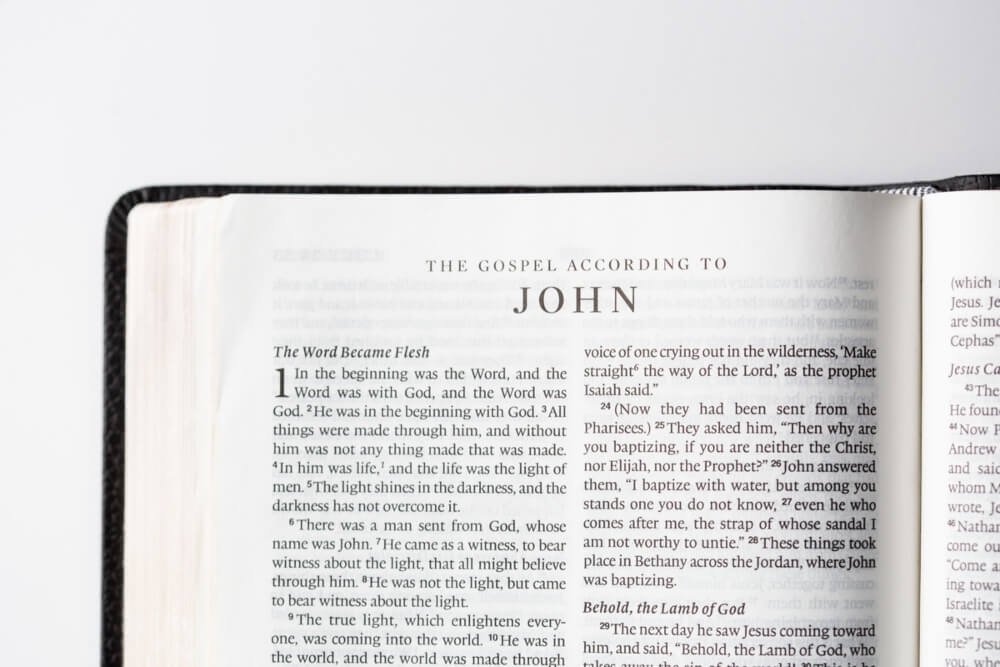
We’ve all heard the jokes about Catholics not reading their bibles.
Perhaps you’ve even heard claims from non-Catholics that the Church discourages reading Scripture or that, prior to Martin Luther, the Bible was not made accessible to laymen. In reality, there were already 199 editions of the Bible in print both in Latin and in vernacular languages prior to the Protestant Rebellion.
The truth is that Scripture is of vital importance for Catholics and always has been. Sacred Scripture exists because of—and has been preserved by—the Church. (The Church existed before the New Testament was written or compiled in one book.)
In fact, Sacred Scripture—together with Sacred Tradition and the Magisterium—form the official teaching authority of the Church, making up the three parts of the Deposit of Faith. This deposit has been passed down through the ages by the Catholic Church, under the guidance of the Holy Spirit. The teachings of the Catholic Church, her sacraments, and her traditions all stem from and are supported by Scripture.
Catholics, Their Bibles, and What the Saints Say

It is true that not all Catholics are in the habit of regularly reading Scripture. We hear readings from Scripture every Sunday—and more often if we’re attending daily Mass—but diving into Scripture during our personal prayer time can feel daunting.
Where do we begin? With seventy-three books—some of which are difficult to understand—we may be uncertain as to the best way to approach the Bible. Perhaps most of what we remember of Scripture comes from our religious education classes when we were children and we’re not sure how to go deeper.
Some Catholics may even wonder at the necessity of reading Scripture, thinking, “If I go to Mass and know the teachings of the Church, why do I need to read Scripture?”
Let’s take a look at what a few saints had to say on the topic.
He will find there [in Scripture] in much greater abundance things that are to be found nowhere else, but can be learnt only in the wonderful sublimity and wonderful simplicity of the Scriptures.
St. Augustine, De Doctrina Christiana 2.42.63
Ignorance of Scripture is ignorance of Christ.
St. Jerome
Reading the Scriptures is a great safeguard against sin.
St. Epiphanius
And from the Catechism of the Catholic Church and the Second Vatican Council:
The Church “forcefully and specially exhorts all the Christian faithful . . . to learn ‘the surpassing knowledge of Jesus Christ’ by frequent reading of the divine Scriptures…Let them remember, however, that prayer should accompany the reading of Sacred Scripture, so that a dialogue takes place between God and man. For ‘we speak to him when we pray; we listen to him when we read the divine oracles.’”
The Catechism of the Catholic Church 2653
The Word of God is so great that it stands as the support and energy of the Church, the strength of faith for her sons, the food of the soul, the pure and everlasting source of spiritual life.
Dei Verbum
It’s clear that the Church considers reading Scripture to be of great importance in the spiritual life. In reading Scripture, we encounter Christ, the Word made Flesh, allowing Him to penetrate our souls and change us from within to be more like him.
So, how can you make Scripture a regular part of your prayer life?
Here are six tips!
1. Set aside a specific time each day.

Find a specific time each day when you’re going to read Scripture.
This could be over a cup of coffee in the morning, or maybe on your lunch break, or right before bed.
Having a set time of day will help you make this habit more consistent. Simply look for a time when you can sit in silence and focus on God.
2. Start small.

Maybe you’d like to work up to reading and meditating on Scripture for half an hour each day, but if you’ve never made this a regular part of your prayer life before, start with five to ten minutes a day and work up to your desired length of time.
This will help you to ease into the habit and have more success maintaining it.
3. Start with a single gospel or one of the epistles.

With so many books to choose from, where to begin?
Try starting with one of the four Gospels: Matthew, Mark, Luke, or John. You may have heard many passages in the readings at Mass or studied Christ’s life before, but reading a Gospel from beginning to end is a whole new experience. Allow yourself to get caught up in the stories, perhaps imagining that you are one of the disciples witnessing the events firsthand.
Another good place to start is with one of the Epistles, such as 1 Corinthians or Paul’s Letter to the Romans.
Although these letters were written to various communities of early Christians in particular contexts, they contain powerful lessons and teachings about Jesus and the moral life which can be applied to any time or place.
4. Use a bible with a good commentary.

Sometimes, passages of Scripture can be difficult to understand. They may require knowledge of other passages or historical events to make sense.
This is where a commentary or study bible comes in handy. Such bibles will include explanations of what is going on in notes, sidebars, and/or appendices.
There are many to choose from, but two reliable Catholic Study Bibles are the Ignatius Catholic Study Bible (New Testament) and the NABRE Catholic Study Bible.
If you don’t want to purchase a separate bible, many bibles at least include notes and cross references for each chapter. Make use of these as you read, and mark up your bible with your own notes and thoughts as you go!
5. Allow time for meditation.

When reading Scripture, it is not enough to just read the words on the page and then close the book and carry on with your day. If this is all you have time for on a given day, it is certainly better than nothing, but the real encounter with Christ in Scripture comes from taking the time to pause and meditate on what you’ve read.
If you’ve taken ten minutes to read a couple chapters of a gospel, take another five to ten minutes to sit in silence with the passages and meditate on what God has said, the goodness of God shown in the passage, and how God is speaking to you through it.
Even if you’ve heard a passage a hundred times before, the Holy Spirit can always enlighten us in new ways. God desires to speak to your heart through Scripture.
Take some time in prayer to be open to His voice.
6. Join or start a bible study.

“Where two or three are gathered in my name, there am I in the midst of them.”
Matthew 18:20
Human beings are made for community. We are made in the image and likeness of our Triune God, so that we thrive when we have others to share our faith with, and to help us grow in relationship with Christ.
That is why joining a bible study can be a fruitful addition to your practice of reading Scripture. Through bible studies, we can learn from the insights and experiences of others.
Many parishes and dioceses offer group bible studies—or you may be able to find one online.
If you can’t find an existing bible study, consider starting your own with some friends or fellow parishioners! You’re sure to not be the only one seeking community.
Consider meeting weekly and studying each Sunday’s Gospel, or make your way through a book of the Bible together.
Your Turn

Praying with Scripture is a great way to grow closer to God and grow in faith.
How will you get started implementing some of these tips?
Share your thoughts with us in the comments below!





